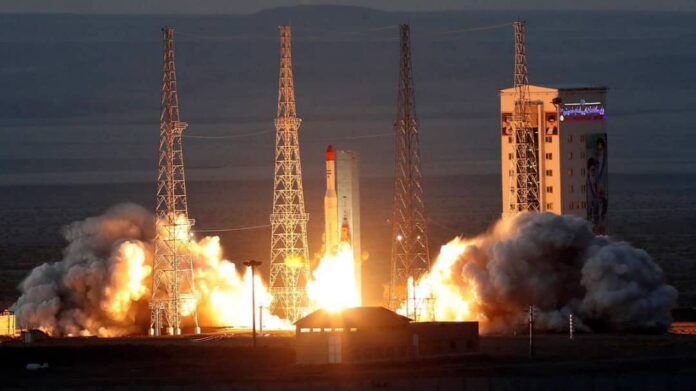Amid middle east tensions, Iran launches heaviest space payload into orbit
Iran said on Friday that it has successfully conducted a space launch with its heaviest payload ever, the latest development in a program the West alleges improves Tehran’s ballistic missile program.
The launch of the Simorgh rocket comes as Iran’s nuclear program inches towards successfully enriching uranium to weapons-grade levels.
Iran maintains its program is peaceful, however government officials in the Islamic Republic have been threatening to potentially develop a nuclear bomb as well as an intercontinental ballistic missile. This would allow Itan to use the weapon against distant countries, for example in Europe and the United States.
Friday’s launch took place at Iran’s Imam Khomeini Spaceport in rural Semnan province, 220 km east of the capital Tehran. Iran’s civilian space program is being developed in the area, where it has repeatedly failed to launch Simorgh launches in the past.
Iran claims the Simorgh rocket carried an “orbital propulsion system”, in addition to two research systems in a 400km orbit above the Earth. Tehran has long sought to develop a system that can change the orbit of a spacecraft, which would then allow it to geo-synchronize the orbits of its satellites.
The rocket also carried the Fakhr-1 satellite, which is named after top Iranian nuclear scientist Mohsen Fakhrizadeh who was assassinated inside Iran, reportedly by Israel.
READ ALSO: Iran receives first 2 Su-35E fighters jets in pieces
It is the first time Iran’s civilian program is known to have carried a military payload, which at 300 kg was heavier than all previous successful launches in the country.
Nevertheless, it has not independently been confirmed whether the launch was successful.
The launch comes at the same time as severe instability reigns in the Middle East, with an ongoing conflict in Syria and Israel’s lengthy war on Hamas in the Gaza Strip, in addition to the fragile ceasefire between Israel and Hezbollah in Lebanon.
The US has in the past told Iran to refrain from any actions that involve ballistic missiles capable of delivering nuclear weapons, and has said its satellite launches defy a UN Security Council resolution.
Previous UN sanctions against Iran due to its missile program expired in October 2023.
Iran’s recently instated reformist president, Masoud Pezeshkian, has indicated he wants to negotiate the sanctions applied by the West, but has yet to offer a concrete idea of Iran’s ambitions in space.
The Simorgh launch was the first conducted by his administration for the country’s civil space program, while its paramilitary Revolutionary Guard conducted a successful launch of its own in September.
Since the collapse in talks between Iran and Western powers regarding its nuclear program, Iran has come close to the production of uranium close to weapons-grade levels. Intercontinental ballistic missiles, meanwhile, can be used to transport nuclear weapons.
Tehran has enough enriched uranium for “several” nuclear weapons, if it chooses to produce them, the head of the International Atomic EnergyAmid Middle East Tensions, Iran Launches Heaviest Space Payload Into Orbit Agency repeatedly has warned.
The country’s government, however, has always insisted that both its space program and nuclear activities are entirely for civilian purposes.
This is despite US intelligence agencies and the IAEA claiming that Iran had an organized military nuclear program until 2023.
Follow the Neptune Prime channel on WhatsApp:
Do you have breaking news, interview request, opinion, suggestion, or want your event covered? Email us at neptuneprime2233@gmail.com





